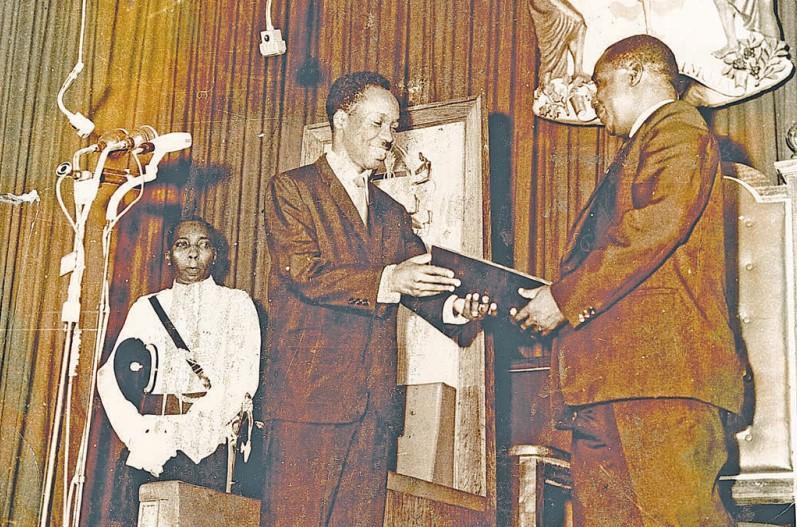Africa-Press – Tanzania. MARKING 61 years, the union between Tanganyika and Zanzibar remains a powerful emblem of national cohesion and transformation having delivered remarkable political, social and economic milestones that continue to shape Tanzania’s stability and regional influence.
Formed on April 26, 1964, this historic alliance gave birth to the United Republic of Tanzania-one of Africa’s most enduring and successful unions.
Among its most celebrated legacies is the country’s unwavering political stability, which has anchored its steady progress over the decades.
Tanzania has become a model for peaceful transitions of power, consistent democratic elections and civic engagement that often surpasses its regional peers.
This stability, lauded both locally and internationally, continues to be a source of national pride.
Vice-President Dr Philip Mpango, in a recent address marking the 61st Union anniversary, reflected on the union’s impact saying the union has fostered unity and solidarity among the people of both Tanganyika and Zanzibar, despite differences in ethnicity, religion, politics and culture.
“This unity is a shield against divisions that could weaken the nation’s strength and stability,” he said.
Dr Mpango underlined that the union has played a central role in maintaining peace and security by instilling a shared national purpose and direction.
This unity has enabled Tanzania to withstand external pressures and internal challenges while maintaining its course of progress.
The transformation of Tanzania’s economy over the past 60 years is equally remarkable, from its agrarian roots in the 1960s, the country has emerged as one of Africa’s fastest-growing economies.
Strategic sectors such as mining, agriculture, tourism and telecommunications have experienced dynamic growth, unlocking unprecedented opportunities for investment and development.
According to Dr Mpango, “The union has created greater opportunities for investment and business in both regions, which in turn has improved citizens’ livelihoods and fueled sustainable development.”
Monumental infrastructure initiatives like the Standard Gauge Railway (SGR), expanded ports in Dar es Salaam and Zanzibar and advancements in hydro and gasbased power have significantly enhanced trade and connectivity.
Zanzibar, in particular, has capitalised on its tourism potential, becoming a cultural and travel hub in the region. On the international stage, Tanzania has harnessed its stability to emerge as a leader in regional diplomacy.
As a founding member of the African Union (AU), East African Community (EAC) and Southern African Development Community (SADC), the country continues to shape regional integration and policy.
“The union has strengthened Tanzania’s voice in international platforms, allowing the country to exert greater influence in regional and global matters,” said Dr Mpango.
He further stressed that preserving and strengthening the union is essential for future generations.
“A strong union lays a firm foundation for social, economic and political heritage for our children and grandchildren. It must continue growing and benefiting all our people,” he said.
Echoing these sentiments, Engineer Hamad Masauni, Minister in the Vice-President’s Office (Union and Environment), underscored the union’s significant strides across political, economic and social spheres.
He described it as a living testament to Tanzanian unity, nationalism and brotherhood. “Our union has helped us achieve political and socioeconomic milestones.
It symbolises our brotherhood and strengthens our diplomatic ties in this era of economic diplomacy,” he remarked during a recent symposium in Dar es Salaam.
Eng Masauni highlighted the transformative impact of the union on Tanzania’s development landscape.
“When we launch different development projects, they send a clear message to our communities that the union brings not only political benefits, but also tangible economic ones that directly impact people’s lives,” he said.
Despite ethnic, religious and linguistic diversity, the union has fostered a robust Tanzanian identity.
Kiswahili, the national language, has served as a powerful unifier, while cultural interactions between the mainland and Zanzibar have enriched national cohesion.
“The peace and stability we enjoy didn’t happen by chance. While many nations struggle with political instability and divisions, Tanzania stands united and the union is one of the key reasons,” he said.
According to Eng Masauni, the union’s impact also extends to education, healthcare and social welfare.
Tanzania’s literacy rate has risen dramatically, propelled by universal primary education and expanded secondary and tertiary institutions. Before the union, the country had fewer than 41 secondary schools today, that number exceeds 10,000.
In healthcare, coordinated national responses to crises like HIV/AIDS, malaria and COVID-19 have been possible due to unified governance.
The number of health centers has grown significantly, demonstrating the union’s widereaching influence.
“These achievements are so apparent they don’t even require statistics. Even our economy is growing-our GDP growth rose from 5.1 per cent to 5.6 per cent in just one year,” said Eng Masauni.
He also said access to clean water has also improved dramatically, with 97.9 per cent of Tanzanians now benefiting from reliable water services a major milestone under the union’s stewardship.
Eng Masauni further expressed a notable achievement particularly in the drastic reduction in union-related disputes, from 25 down to just three, currently undergoing resolution.
“This success, attributed to effective collaboration between government ministers and secretaries, has been further accelerated by President Samia Suluhu Hassan’s “4R” reconciliation policy, which resolved 13 disputes during her tenure,” he said.
Moreover, Registrar and CEO of Copyright in Zanzibar, Mtumwa Khatib Amir, also addressed the symposium, underscoring the union’s influence on Tanzania’s global standing.
“With a united voice, Tanzania contributed to the NonAligned Movement during the Cold War and supported the liberation of Southern African countries,” she said.
As Tanzania continues its journey of unity and development, the spirit of the 1964 union remains alive and vital.
The successes of the past 61 years are not merely historical triumphs but living testaments to what can be achieved when a nation chooses unity over division and progress over stagnation.
Source: Daily News
For More News And Analysis About Tanzania Follow Africa-Press







